Measles, rubella and mumps are infectious diseases that have traditionally been considered childhood diseases. This definition is due to the fact that children of preschool and primary school age suffer from these infections more often than adults.
Measles, rubella and mumps can be ill only 1 time in a life. There is no cure for these infections, and after the disease immunity is developed for life. Sometimes these facts about childhood infections make parents think that vaccinating against measles, rubella and mumps is a futile exercise: it's okay to get some of these infections, so why get extra vaccines? In fact, the infections themselves are not so terrible as the possible consequences and complications after them. Consider how measles, rubella and mumps occur, what complications are possible after them, and what are the rules for vaccinating against these infections.
Measles
This is an infection that can be caught by airborne droplets. The spread radius of measles virus is quite large, therefore, when one sick person appears in a children’s team, almost all children in contact with him become ill.
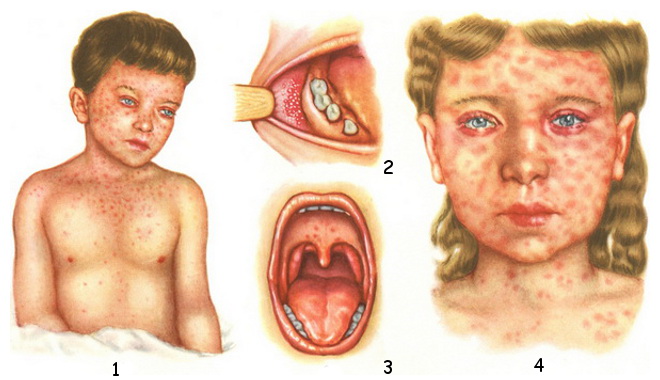
First, measles manifests itself as an ordinary respiratory viral infection: a child has a fever (up to 39 degrees), a cough, a runny nose, and the eye mucosa may become inflamed. A few days after the onset of the disease, the child develops a rash. Rashes characteristic of measles are white dots that first appear on the face and then spread throughout the body. Within a week, the disease progresses: the temperature keeps, the rash becomes more and more, and then it goes down, the temperature and the rash recede, and the spots remaining from the rash pass by themselves in 3-4 days.
Children up to a year of measles practically do not get sick, because they get maternal antibodies to this infection. In most cases, in childhood, measles is easily tolerated, but it can cause complications in the form of otitis media (inflammation of the middle ear), pneumonia (pneumonia), encephalitis (inflammation of the brain). If an adult is ill with measles (and this is possible if he did not get vaccinated and did not get sick in childhood), the disease will be difficult and the risks of complications increase at times.
We read in detail:Measles in children: the first symptoms, treatment and prevention
Rubella
This infection is also considered to be “childhood”, and children can get rubella in a very mild form, and as a result do not even know the exact diagnosis, since the symptoms of a mild form of the disease do not differ from ordinary SARS. The main symptoms are fever, headache, general malaise, in more severe cases, lymph nodes may enlarge and a small rash appears on the face and body (which is easily mistaken for an allergy to drugs).
In children, rubella complications are extremely rare: encephalitis develops in about one in 1000 cases. Rubella is not so harmless for adults.Adults tolerate the disease very hard and the risks of complications increase significantly. Rubella is especially scary for pregnant women: in pregnancy, this infection can cause severe fetal abnormalities. It is in order to prevent such problems in the future that the rubella vaccine should be given in childhood.
Mumps or "mumps"
Mumps are also transmitted by airborne droplets, but their virus does not spread as easily and quickly as the measles virus, so it’s more difficult to become infected with mumps. The main distinguishing feature of this disease is inflammation of the salivary glands under the jaw and behind the ears. Due to this inflammation, the face seems to swell, hence the name "mumps", and it is painful for a sick person to chew and swallow in an acute period. In addition to inflammation of the salivary glands, mumps is characterized by already known symptoms of a viral infection: high fever, malaise.
Possible complications after mumps: pancreatitis (inflammation of the pancreas), meningitis or meningoencephalitis (inflammation of the membranes or tissues of the brain). The mumps gives the most dangerous complications to the reproductive system: in boys, this is inflammation of the testicles (orchitis), and in girls, it is ovarian damage (oophoritis). The severity of these complications can be different, sometimes even infertility. You can protect your child from the risks of having such health effects through vaccination.
Measles, rubella, and mumps vaccination
Before you get vaccinated, read the article on how to prepare your child for vaccination - rules, tips and tricks – https://kid.htgetrid.com/en/zdorove-rebenka/privivki/pravilnaya-podgotovka-malyisha-k-privivke-kakie-nyuansyi-nuzhno-uchest-pered-privivkoy.html
According to the vaccination calendar (see vaccination calendar for children under 1 year old in Russia – what moms need to know), the first vaccination against measles, rubella and mumps is carried out according to this schedule:
- first vaccination - in 1 year
- revaccination - after 6 years.
If vaccinations were not given on time, then they are given after 13 years.
Usually vaccination consists of two vaccines: doubled from measles and “mumps” and separate from rubella. In clinics, all vaccinations for children are free and vaccines already purchased are used: the first is of Russian production, the second is of Indian origin.
If parents want to reduce the number of injections or trust foreign vaccine manufacturers more, you can buy and deliver an imported triple vaccine (MMP-II, Priorix). True, in the case of measles, rubella and mumps vaccination, it turns out that domestic vaccines are better tolerated and less likely to cause allergies, because quail protein is used as one of the components, and chicken is used in foreign ones.
Vaccinations for measles, rubella and mumps can be given on the same day as any other vaccine except for BCG. In some cases, vaccination against these infections will have to be abandoned. Contraindications for measles, rubella and mumps vaccination are:
- immunodeficiency states
- the presence in the past of strong allergic reactions (especially to chicken protein)
It is worth temporarily postponing the vaccine if the child has recently received a blood transfusion. In this case, vaccination is delayed for 3 months.
After vaccination
Vaccination against measles, rubella and mumps usually does not cause a reaction in the child. The maximum is a little swelling and reddening of the injection site, there may be a slight soreness in this place.
In cases where the reaction still appears, it may not appear immediately, but after 1-2 weeks. The child may have a fever (read the article: temperature increase in a child after vaccination - is it normal or to sound the alarm?) and suddenly appear signs of acute respiratory viral infections (runny nose, cough, swollen lymph nodes). Symptoms of an allergic reaction sometimes appear.
To prevent complications from vaccination, you can give your child an antiallergic agent in advance. Unpleasant sensations are removed with painkillers, all other signs of complications are also removed symptomatically (antipyretic at a temperature, nose drops with a runny nose).
In general, measles, rubella, and mumps vaccines are considered the “easiest” for the child, and they protect him from serious health problems in the future, so it is not reasonable to refuse vaccination because of the belief that vaccines are harmful. Timely vaccination against seemingly harmless childhood infections, carried out according to all the rules, will not do any harm and will only help maintain health.
A popular question: Is it possible to bathe a child after vaccination against measles, rubella, mumps
We also read: Mantoux vaccination
Encyclopedia of a young mother. Vaccinations:
[sc: ads]

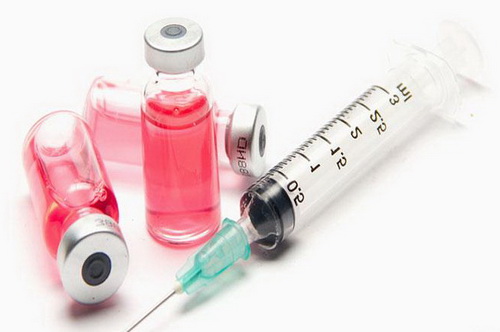
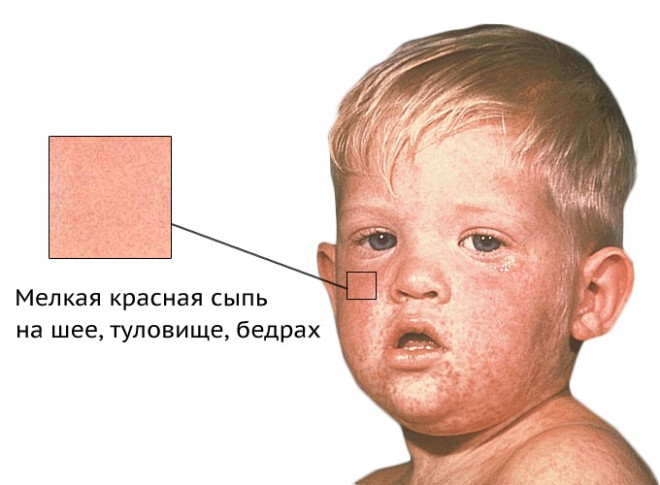
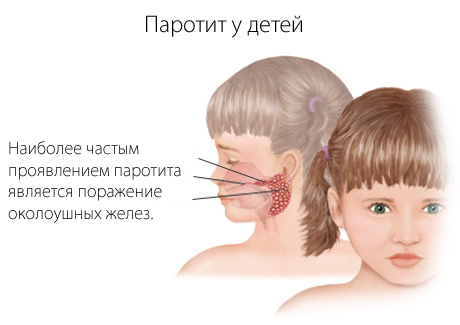
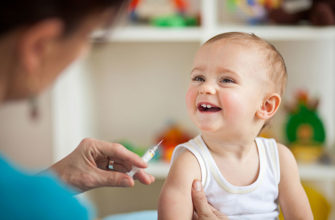
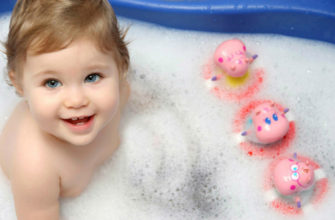
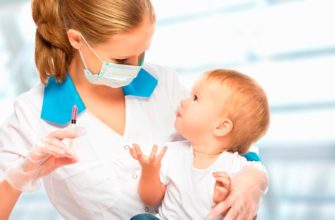
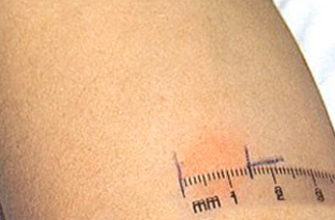
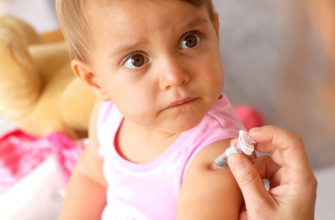
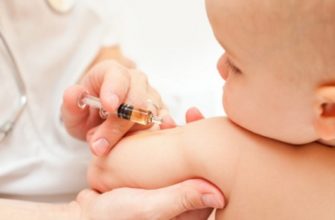

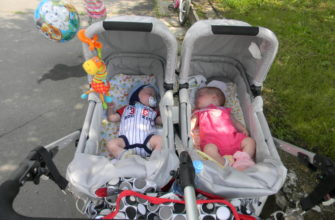
I also have a child, and of course we gave him the vaccinations, because the diseases are serious enough and I do not want to consciously endanger my child.
Vaccinations are actually useful and should not be abandoned in any case. Yes, the child may have a reaction to them in the form of temperature, but in the future he will be protected.
I will become a mother in a few weeks, but already decided for myself that I will not refuse vaccinations. I want my child’s health to be good and not suffer from any infections.
To be honest, I don’t understand those parents who consciously take such a step and do not vaccinate their children. And then they will shrug their hands around why their child got such severe infections.
It is good that in our time they are given such vaccinations. For me, this is a serious guarantee that my child will not get sick and will feel good. And then the consequences of these diseases are too serious.
Nice Cap attempt, but no! Comments all under one comb - it is necessary, important, useful ....
PEOPLE (Sane) - REMEMBER ONCE AND FOREVER - VACCINATION IS THE LEGALIZED GENOCIDE.
Arividerche!
In any case, the doctor should strive to take into account all the possible negative consequences of vaccination and revaccination against measles, rubella, and mumps for each specific child.
The vaccine can be used to re-vaccinate people previously vaccinated with the combined measles, mumps and rubella vaccine.